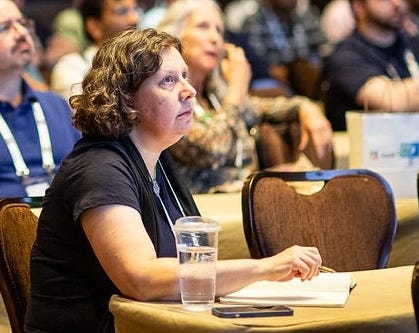My first conference in person was incredible. More later about the content — here’s what I learned from the experience of attending.
First… ever?
It’s true. I’ve been in tech for 25+ years, and yet DevOps Enterprise Summit 2023 in Las Vegas was my first in-person conference.

I worked for many years at a company with proprietary everything. The closest we had to a “conference” was the occasional meeting in the company auditorium. You drive 20 minutes, everyone there is also from your company, there’s an hour or three of presentations, you grab lunch with your team from the cafeteria… it’s just not the same.
When I started to work with more mainstream tech, I did come closer to the conference experience. I traveled to a nearby Google Cloud event, for example, although that was more of a sales pitch than a conference (the food was great though). I attended ng-conf, too, but only virtually.
And then I switched companies… and then there was a pandemic. I went to a few more virtual conferences, including the 2022 virtual DevOps Enterprise Summit. Still nothing in person.
Expectations
I did know a little of what to expect in person. The virtual conference gave me some idea, and the people I met through that spoke glowingly about the community that sprung up around this specific conference. I was definitely not disappointed.
When I was younger, I worked in a nuclear medicine research lab (like one does). The researchers would attend Society of Nuclear Medicine conferences. They returned with stories to tell — usually about what each vendor sponsored for dinner.
A few years later, when I was a newbie network admin, colleagues and friends of mine would go to NANOG or to LISA. I never did attend either, but I learned from friends that post-conference blues are a thing.
Still, that’s not much, so I did some research online prior to attending. What to expect? What to bring? What to do? It’s hard to know what advice will be applicable, but here’s what I ultimately found helpful.
Logistics
Getting there: direct + rideshare
If you can get a direct flight, do that. I had to leave my house at 4am, which I regretted — briefly. But once I was boarding that plane, I didn’t regret that decision at all.
I took an Uber to the airport (I live near a big city, which increases my odds of getting an Uber at 4am) and from airport to hotel and back. Cheaper than airport parking, cheaper than shuttle parking + ticket, about on par with a taxi, no messing around with public transit.
Where to stay: in the conference hotel
I did, and it made things so much simpler. Fewer concerns about weather, how long it takes to get somewhere, or being out after dark. A few people online said that they liked staying elsewhere as a sort of retreat from the conference, but that didn’t seem necessary to me. My hotel room was surprisingly quiet.
What to eat: yeah, about that…
I actually started out imagining that I was going to go to Target before the conference to pick myself up some food so I would have something in the room for breakfast. Fortunately, before I even got to Vegas, I realized that there was no way I would be doing any such thing. I’m almost embarrassed to admit that I even considered it.
That said, we weren’t sure what meals would be provided at the conference. It turned out: all of them, for the three main days of the conference. I went to the breakfasts and lunches, but not the dinners.
See, we didn’t know there would be dinners. We assumed not (hey, this wasn’t the Society of Nuclear Medicine, no doctors to impress). We were wrong on day one, but we assumed that was a one-time thing. We were wrong again on day two, but surely, we thought, by day three, people were filtering out and there certainly wouldn’t be another evening event with food… wrong again.
The hotel restaurants were all surprisingly good, though.
What I brought
What to wear: flexible and comfortable
It’s a tech conference, and I wasn’t presenting, so I didn’t feel a need to dress up. The best advice I read: bring a jacket, because it can get chilly, and wear comfortable shoes, because you’re on your feet a lot.
Beyond that, I had a uniform of sorts — short sleeved merino shirts, hiking pants or a skirt. My advice: wear what you feel comfortable and confident in. I didn’t check a bag, so I kept it lightweight and compact.
Specifics: Coolibar Sprinter Sport Jacket, in black: it’s no blazer, but it was so lightweight and the pockets zip closed. Coolibar Sanibel Everyday Beach Shawl worked as a scarf, as a wrap, and as a blanket on the plane. Icebreaker merino Tech Lite II shirts, Prana hiking pants, and RipSkirt Hawaii skirts — super comfortable skirts with pockets I can put my phone in with no bulge. That’s some magic right there.
What to bring: I traveled light
I brought my personal laptop, and I hardly used it. I took notes with a pen in a notebook (Pigma Micron 05, Moleskine dotted page, not that you asked). I’d only bring a laptop again if I absolutely had to for work. Otherwise, there’s a computer in my pocket, what do I need a laptop for…
I brought a small reusable bottle for water, but not soap to wash it, so that was pointless. Bottled water was eight bucks from the hotel store, so instead I got a large herbal tea each morning and refilled the cup with water throughout the day.

I brought a slim day pack as my “personal item”, and that was perfect for toting whatever I wanted with me that wouldn’t fit in my pockets (like the notebook and the scarf).
I went through a pack of gum surprisingly fast and bought breath freshening strips at the hotel store when I ran out. Earplugs got used — my hotel room was quiet, but my travel CPAP machine is not. I wore compression socks on the plane, it’s hard to tell if they helped.
The internet said to bring business cards; I did not, and I didn’t need them. The hotel had a pool and a gym, but I brought neither a swimsuit or workout clothes, and I didn’t regret it. I didn’t bring anything “dressy” for going out, and that was also fine.
Given that I wasn’t checking a bag, I declined most of the freebies (socks were “in”). I did bring home signed books, a conference T-shirt and bag, and a bunch of stickers. I was pretty pleased that I could fit four books in my carry on!
What I did
Choosing sessions: I overdid it
I didn’t want to miss a moment, so I attended as many sessions as I possibly could. This was probably not a great idea. It would have been healthy for me to skip a session every now and then to just give my poor brain a break! All of them were recorded (see https://videos.itrevolution.com/), so there was no need to try to cram.
Vegas things: I didn’t
I’ve been to Vegas once before. It’s not my favorite. I felt like I’d done that tourist thing once, and I didn’t have any interest in doing that again. I didn’t do any sightseeing. I didn’t go to any shows. I walked through the hotel casino, but I didn’t do any gambling.
The only “gambling” I did was finding an Art-o-Mat machine which didn’t have a placard in one of the spots. I put my $5 in and actually got some art from an artist whose work I’d seen online before. I call that a win.
That said… I also didn’t leave the hotel for five days. I discovered when I got home on Friday night that the last time I’d been outside, not under a roof, was when I was waiting for that Uber at 4am on Monday morning. Ooops. That part wasn’t necessarily a good idea.
Meeting people: do this, not that
Best moment in meeting people was when I simply walked up to a group that seemed to be talking and laughing amongst themselves, and asked if I could join them. They were friendly indeed, and I wound up with a few new contacts. They explained about the “doughnut” (a closed circle of people, not welcoming newcomers) vs. the “croissant” (an open C shape, more welcoming of newcomers) and we made sure we were still in croissant formation after I joined.
Worst moment in meeting people was when I decided not to be put off by the unwelcoming vibe at one of the lunch tables. I plunked myself down anyway, followed by a colleague. Well. My colleague and I ended up spending the time talking to each other, because my initial read on that table was spot on. I did my best nodding and smiling in a friendly sort of way to the rest of the table, and nobody was having it. Hey, not a problem, not everyone needs to be social with new people all the time. Just saying that, if I’m looking to meet new people, I’m going to trust my instinct about the group I’m approaching.
(Second worst moment — if only because it was much shorter — was the guy in the casino who stumbled drunkenly towards me, beer bottle in hand, as I was going to get coffee at five in the morning. He gave me a slurred “how you doin’,” and I simply walked around him. Ah, five in the morning in Vegas.)
Also, something new I learned: when I’m tired, I tell stories with the history of the entire universe as a backstory. It certainly keeps the conversation going (and going, and going…) but it doesn’t let the other person get a word in edgewise! Let the other person know who you are, sure, but you also want to know who they are. Sorry Dave Stanke! 😂
Speaking of which, this post has already gotten much longer than I planned…
Looking forward to future posts to tell you more about the conference itself. And I’m definitely looking forward to being a conference-attending veteran at DOES 2024!
Originally published 21 October 2023 on Medium.


















